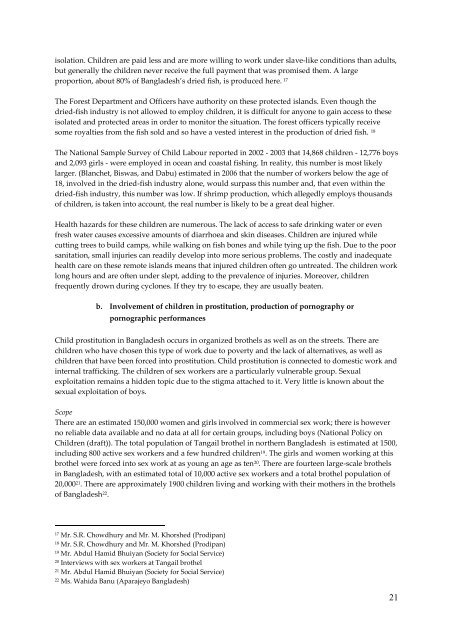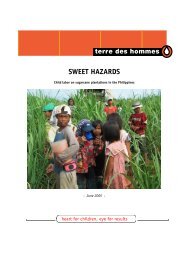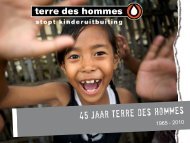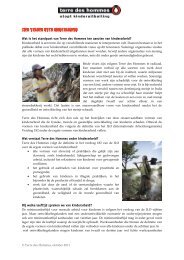Untitled - Terre des Hommes
Untitled - Terre des Hommes
Untitled - Terre des Hommes
- No tags were found...
Create successful ePaper yourself
Turn your PDF publications into a flip-book with our unique Google optimized e-Paper software.
isolation. Children are paid less and are more willing to work under slave-like conditions than adults,<br />
but generally the children never receive the full payment that was promised them. A large<br />
proportion, about 80% of Bangla<strong>des</strong>h’s dried fish, is produced here. 17<br />
The Forest Department and Officers have authority on these protected islands. Even though the<br />
dried-fish industry is not allowed to employ children, it is difficult for anyone to gain access to these<br />
isolated and protected areas in order to monitor the situation. The forest officers typically receive<br />
some royalties from the fish sold and so have a vested interest in the production of dried fish. 18<br />
The National Sample Survey of Child Labour reported in 2002 - 2003 that 14,868 children - 12,776 boys<br />
and 2,093 girls - were employed in ocean and coastal fishing. In reality, this number is most likely<br />
larger. (Blanchet, Biswas, and Dabu) estimated in 2006 that the number of workers below the age of<br />
18, involved in the dried-fish industry alone, would surpass this number and, that even within the<br />
dried-fish industry, this number was low. If shrimp production, which allegedly employs thousands<br />
of children, is taken into account, the real number is likely to be a great deal higher.<br />
Health hazards for these children are numerous. The lack of access to safe drinking water or even<br />
fresh water causes excessive amounts of diarrhoea and skin diseases. Children are injured while<br />
cutting trees to build camps, while walking on fish bones and while tying up the fish. Due to the poor<br />
sanitation, small injuries can readily develop into more serious problems. The costly and inadequate<br />
health care on these remote islands means that injured children often go untreated. The children work<br />
long hours and are often under slept, adding to the prevalence of injuries. Moreover, children<br />
frequently drown during cyclones. If they try to escape, they are usually beaten.<br />
b. Involvement of children in prostitution, production of pornography or<br />
pornographic performances<br />
Child prostitution in Bangla<strong>des</strong>h occurs in organized brothels as well as on the streets. There are<br />
children who have chosen this type of work due to poverty and the lack of alternatives, as well as<br />
children that have been forced into prostitution. Child prostitution is connected to domestic work and<br />
internal trafficking. The children of sex workers are a particularly vulnerable group. Sexual<br />
exploitation remains a hidden topic due to the stigma attached to it. Very little is known about the<br />
sexual exploitation of boys.<br />
Scope<br />
There are an estimated 150,000 women and girls involved in commercial sex work; there is however<br />
no reliable data available and no data at all for certain groups, including boys (National Policy on<br />
Children (draft)). The total population of Tangail brothel in northern Bangla<strong>des</strong>h is estimated at 1500,<br />
including 800 active sex workers and a few hundred children 19 . The girls and women working at this<br />
brothel were forced into sex work at as young an age as ten 20 . There are fourteen large-scale brothels<br />
in Bangla<strong>des</strong>h, with an estimated total of 10,000 active sex workers and a total brothel population of<br />
20,000 21 . There are approximately 1900 children living and working with their mothers in the brothels<br />
of Bangla<strong>des</strong>h 22 .<br />
17<br />
Mr. S.R. Chowdhury and Mr. M. Khorshed (Prodipan)<br />
18<br />
Mr. S.R. Chowdhury and Mr. M. Khorshed (Prodipan)<br />
19<br />
Mr. Abdul Hamid Bhuiyan (Society for Social Service)<br />
20<br />
Interviews with sex workers at Tangail brothel<br />
21<br />
Mr. Abdul Hamid Bhuiyan (Society for Social Service)<br />
22<br />
Ms. Wahida Banu (Aparajeyo Bangla<strong>des</strong>h)<br />
21













